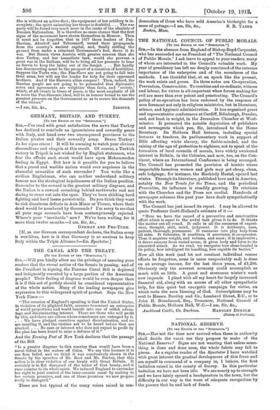THE NATIONAL COUNCIL OF PUBLIC MORALS.
[To THE EDITOR Or THE " SPEOTAT01."]
SIR,—In the absence from England of Bishop Boyd Carpenter, who has succeeded me as President of "The National Council of Public Morals," I ask leave to appeal to your readers, many of whom are interested in the Council's valuable work. My year of presidency has left me deeply convinced of the extreme
importance of the enterprise and of the soundness of the methods. I am thankful that, at an epoch like the present, the work exists and grows. Its three notes are Co-operation, Prevention, Construction. To combine and co-ordinate, witness
and labour, for virtue is all-important when forces making for evil are more than ever potent and penetrating. The Council's policy of co-operation has been endorsed by the response of men foremost not only in religious ministries, but in literature, science, and hygienic administration. It has organized great and representative conferences at Cardiff, Edinburgh, Dundee, and, not least in weight, in the Jerusalem Chamber at West- minster. It promoted the notable deputation of publishers and newsagents which you, Sir, introduced to the Home Secretary. Its Holborn Hall lectures, including special lectures to teachers, its parliamentary work in support of Bills affecting white slavery, the feeble-minded, and the raising of the age of protection to eighteen, not to speak of the formition of local councils of morals, have widely awakened interest in Britain, in the Colonies, and now, too, on the Con- tinent, where an International Conference is being arranged. The Council has promoted the provision of hostels where respectable homeless women and girls may get cheap, clean, safe lodgings; for instance, the Mackirdy Hostel, opened last winter. Through its literature, published here and in America, notably the New Tracts for the Times, and the periodical .Prevention, its influence is steadily growing. Its relations with the Churches and the Press are cordial. Hundreds of newspaper columns this past year have dealt sympathetically with the work.
The Council has just issued its report. I may be allowed to quote Professor Scott-Holland's estimate of it :— "Here we have the record of a preventive and constructive effort which is equal to the awful task given it to do. It thinks the matter out all round. It calls in all the resources of experi- ence, thought, skill, mind, judgment. It is deliberate, sane, patient, thorough, permanent. It summons into play help from all sides. It federates, it combines, it associates, it co-operates. Thus it acquires weight, and volume, and mass ; it is impressive ; it draws succour from varied areas; it gives body and force to its concerted attack. As we read, we recognize how clear-headed is its policy, how intelligent its handling, how capable its tactics."
Now all this work (and let not constant individual rescue efforts be forgotten, some in cases unspeakably sad) is done on an average income, for the last three years, of £1,200. Obviously only the severest economy could accomplish so
mach with so little. A great and strenuous winter's work now impends. I plead with all my heart for largely increased financial aid, along with an access of all other sympathetic help, for this quiet but energetic campaign for virtue, on which rests the sure blessing of God. Subscriptions may be sent to Messrs. Barclay and Co., Lombard Street, E.C., or to John H. Broadmead, Esq., Treasurer, National Council of Public Morals, Holborn Hall, W.C.—I am, Sir, 8c.c., Auckland Castle, Co. Durham. HANDLEY DUNELM
(Bishop of Durlaun).














































 Previous page
Previous page